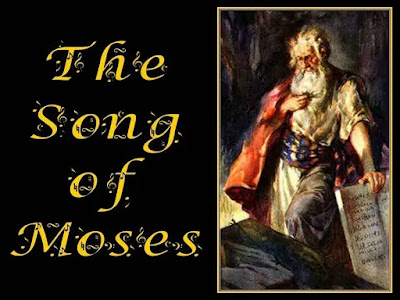[ photo: godshotspot.wordpress.com -- check them out ]
Song of Moses -- Part I -- Establishing Who God Is and What We've Done -- Deuteronomy 32:1-7
The Song of Moses (a Song of Instruction so called to distinction it from Moses' Song of Praise and Harmony in Exodus 15) describes in great detail the relationship between God and mankind, and in particular, God and His chosen people, the Israelites at the time they were about to enter the Promised Land. It is well written as both a reminder and a warning that needs to be taken to heart by Israel. For us, it provides incredible insight into God's thoughts, actions, and feelings. It also provides us with lessons we need to learn and observe today. Here are the key points by verse number.
1. Moses is not just vocalizing this Song to the Israelites -- for he calls on the heavens and the earth to hear his words. Thus, this is a Song for us just as much as for Israel and as such we'll look at the words from our perspective wherever possible, using the pronoun 'us'. But he also calls on heaven and earth to be a witness against our failures and sins. Commentators describe both possibilities.
2-3. Moses intends the Song to be accepted as either refreshing or sweeping teaching for he is proclaiming the Lord's name and ascribing greatness to Him. Matthew Henry writes:
"It shall be a beating sweeping rain to the rebellious;' so one of the Chaldee paraphrasts expounds the first clause. Rain is sometimes sent for judgment, witness that with which the world was deluged; and so the word of God, while to some it is reviving and refreshing-a savour of life unto life, is to others terrifying and killing-a savour of death unto death. It shall be as a sweet and comfortable dew to those who are rightly prepared to receive it."
4. God is solid like a Rock who does perfect work; is totally just; faithful; and righteous.
5. But we have acted with corruption towards Him. We have not behaved like his children as we are a perverse and crooked generation. We note that we corrupted ourselves; God has not corrupted us -- He is the antithesis of corruption. And we did this says Henry via a "spirit of contradiction, and therefore would do what was forbidden because it was forbidden, would set up their own humor and fancy in opposition to the will of God, were impatient of reproof, hated to be reformed, and went on frowardly in the way of their heart."
6. Moses then calls us foolish and unwise, and asks if that is anyway for anyone to 'repay' God, who made, established and bought us. In light of that, it is indeed foolish of us to rebel against God. We have deserted God, not the other way around.
7. And then he tells us to remember our past. And in particular that we should remember in our own lives, how many times God's mercies were bestowed upon us.
So, what can we take from these first seven verses of Deuteronomy 32, the verse section of Moses' Song of Instruction?
May I suggest we reflect on three things:
a. God's characteristics,
b. God's record with respect to us,
c. and our foolishness and rebellion.
Dare I ask, "How dare we?" And yet that is what each of us should be asking ourselves.
Note to reader: If you like the way we are studying scripture, why not subscribe to our posts by providing us just with your email? You can do that to the right of this column in the "Subscribe to" section. You can also search our earlier studies in the "Blog Archive" section below that. Finally, please encourage others to study along with us by sharing this link with your family and friends. Thank you and God bless. Ken G.
It would be great if you would share your thoughts or questions on this blog in the comments section below or on social media.

Until I read your blog I had no idea how these passages applied to us today. I can't thank you enough for the thought and study you have put into these presentations, Ken. It is greatly appreciated.
ReplyDeleteThanks Bob. I pray many will be blessed.
Delete